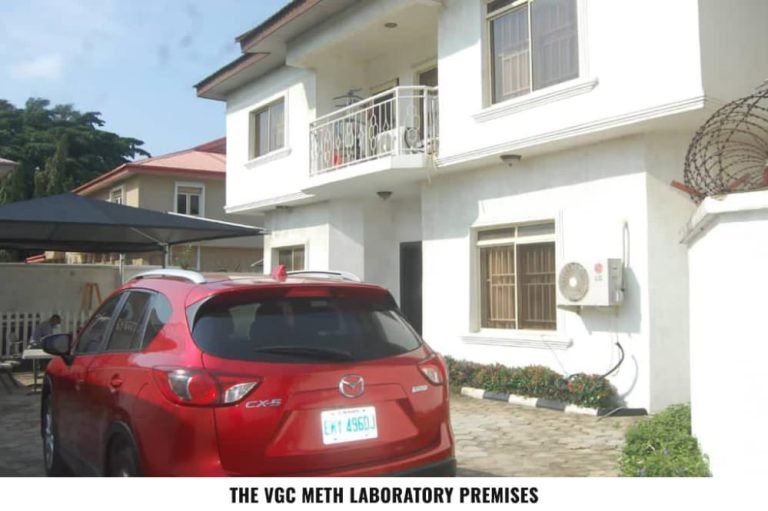By Ibironke Ariyo
Operatives of the National Drug Law Enforcement Agency (NDLEA) have busted two ‘Mpkuru mmiri’ (methamphetamine) manufacturing facilities called Meth Laboratories in Lagos and Anambra respectively.
The Chairman (NDLEA), Brig-Gen. Buba Marwa (rtd), said this at a news briefing on Tuesday in Abuja.
Marwa said that the first one, located in Victoria Garden City (VGC) Estate, Lekki, Lagos, was owned by a baron, Mr Emeka Nzewi.
He added that the second, in Nise Community of Awka South Local Government Area of Anambra State was owned by Paul Ozoemenam.
According to him, the owners of the two illicit meth laboratories were successfully arrested alongside Sunday Ukah from Aba, Abia, the cook or chemist that produces the drug for them.
Marwa said that the laboratory in Lagos was set up inside the Boys’ Quarter building of a four-bedroom duplex.
He said that the operatives recovered a total of 258.74 kilograms of crystal methamphetamine and various chemicals used for the production precursorof the toxic drug.z
He also said that the complete paraphernalia Laboratory equipment such as gas cylinders, giant gas burners, industrial face masks, industrial gloves, tubes and flat-bottomed conical flasks, among others were also found.
“NDLEA is obliged to brief the public about this recent bust to raise people’s awareness of the danger that meth production constitutes to public health.
“And also to let you know the modus operandi of the barons involved in this unwholesome activity. We believe the knowledge will raise public awareness about the risk of meth production in their vicinity, “he said.
The NDLEA boss said that the owner of the laboratory in VGC, for instance, was producing this highly unstable and toxic drug in a house where he lived with his family.
This he said ”speaks volume about his insensitivity to the consequences of exposing his family, which included a three-month old baby, to the danger of hazardous chemicals.
“If that is the case, that is an indication that public health was of no concern to him.
“In this particular case, aside from the laboratory being close to the kitchen of the main house, the waste from the laboratory was channelled into the septic tank and soakaway in the compound.
“This is with a high risk of contamination of the water table of the entire neighbourhood,” he said.
Marwa said that on average, the lab produced 50 kilos of methamphetamine every week with plans underway to increase the capacity of production to at least 100kg per week.
“Where do these drugs end? From our preliminary interrogation, we now know the drugs from this lab were both for export and local consumption.
“We also know there is a supply chain of distributors and buyers for export and the domestic market.
“When you consider the fact that the price of this dangerous drug was going for as high as 500,000 dollars per kilo in the international market in recent time, you will understand why Nzewi cared less to put the lives of his own family at risk by producing this in the same house where they live.
“Hence, taking these two labs out of operation is a major feat in our continuing effort to curb the meth problem, ” he said.
Marwa said that the operation also exposed the interconnectivity among syndicates involved in meth production saying that the cook was hired by both producers.
He said that the cook produced for the VGC lab, as well as the lab in Anambra.
“As we step up the offensive against drug traffickers, we want the public to be more vigilant and be aware of the fact that producers of methamphetamine always choose unsuspecting environments with tight security, such as the VGC estate, in this case.
“And, the reason is not far-fetched: They choose secured estates to prevent law enforcement agents from monitoring their activities.
“They also locate meth labs in remote unsuspecting communities where residents will not be aware of their activities,” he said.
The NDLEA chairman said that it was very important to note that the waste from methamphetamine production was dangerous to the ecosystem.
He said that the chemicals were toxic and once they seep into the soil, they contaminate the water table from which surrounding wells and boreholes draw their water.
He added that citizens who unwittingly consume the water from such sources were exposed to heart and kidney ailments and other organ diseases.
According to him, neighbours, too, who inhale gases from the lab, are also susceptible to the same risk.
“What makes it worse is that the production usually takes place in the middle of the night, between 11 pm and 4 am, and therefore, unsuspecting neighbours could have been exposed to the hazards for months or even years, ” he said.
Marwa commended the professionalism of the intelligence led special units assigned to the task, the forensic experts and the 200-man strike force team that were deployed who were the operational arm that executed the mission.
(NAN)
